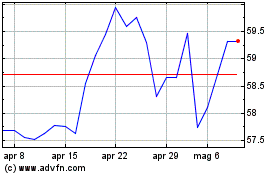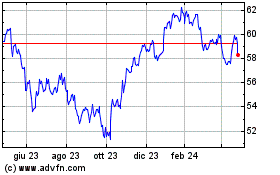Terviva Partners With Danone for Pongamia Tree-Derived Food
20 Maggio 2021 - 4:40PM
Dow Jones News
By Dieter Holger
Terviva Inc. entered into a deal with Danone SA amid its latest
funding round to explore food made from pongamia trees, a tropical
plant it says is more resilient and environmentally-friendly than
soy and palm.
The Alameda, Calif.-based startup, founded in 2010, said
Thursday that the Danone agreement comes after the company raised
$54 million in its fifth funding round to market pongamia trees, a
little-known oilseed plant native to parts of Asia, which can grow
on land that is typically difficult to farm, providing a source of
protein-rich edible oils from beans that can help feed the world's
population.
"We are excited to team up with Terviva to co-develop important
ingredients--edible protein and oil--from the pongamia tree, while
also rehabilitating the soil the tree grows in," said Merijn Dols,
global director of open innovation and circular economy for food at
Danone.
The financial details of Terviva's deal with Danone weren't
disclosed.
Terviva said it expects to raise an additional $24 million in
equity and debt capital, totaling $78 million in capital this
quarter. It has more than 1,000 acres of pongamia planted with
growers in Florida and Hawaii.
The company declined to provide its estimated valuation
following the latest funding round.
For the past five years, the company has focused on testing
whether the pongamia tree can be scaled up as an agricultural crop
and now has its sights on using the tree's oils for a variety of
plant-based food products, with similar applications as olive oil
or other cooking oils, said Naveen Sikka, chief executive of
Terviva, in an interview.
"We need to change how we grow things and what actually goes on
the plate," he said.
The company said it currently works with farmers who are
reforesting distressed or degraded agricultural land in Florida,
Hawaii, Australia and India. Next year, Terviva plans to open a
facility in the U.S., where it will process pongamia beans to make
foods.
An orchard of pongamia trees grown on land with poor soil or
water stress can capture 115 metric tons of carbon per acre over 30
years, Terviva said, ranking pongamia highly as a sustainable
source of edible oil and plant protein.
More resource-efficient farming practices could help companies
and governments meet their climate-change goals, sustainability
experts say. Food accounts for around 26% of the world's
greenhouse-gas emissions, according to a study published in the
journal Science in 2018.
Companies are increasingly touting agriculture as a way to
tackle climate change. Last month, PepsiCo Inc. put its weight
behind so-called regenerative agriculture to bring the burgeoning
practice to 7 million acres of farmland, the equivalent of
PepsiCo's entire agricultural footprint. In 2018, Danone North
America said it would invest up to $6 million toward research to
improve soil health.
Regenerative agriculture remains a loosely-defined concept since
there is an absence of widely accepted global standards, but the
practice generally involves using plants to soak up carbon-dioxide
emissions, which can earn farmers valuable carbon credits, as well
as lowering crops' environmental footprint by cutting water and
chemicals use and managing soil in a way that slashes
emissions.
Write to Dieter Holger at dieter.holger@wsj.com;
@dieterholger
(END) Dow Jones Newswires
May 20, 2021 10:25 ET (14:25 GMT)
Copyright (c) 2021 Dow Jones & Company, Inc.
Grafico Azioni Danone (EU:BN)
Storico
Da Mar 2024 a Apr 2024

Grafico Azioni Danone (EU:BN)
Storico
Da Apr 2023 a Apr 2024
